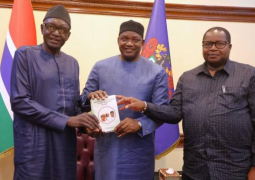
He called on key institutions including the National Assembly, Ministry of Justice, National Human Rights Commission, and Ministry of Defence to urgently intervene and advise the CDS to align his actions with the law.
The controversy erupted following remarks by CDS Mboob, who was quoted telling soldiers:
“If you see that he is visibly holding a weapon that could turn against you, shoot to kill, and there is no regret about that. There is no ambiguity.”
Jobarteh warned that such a blanket directive, devoid of legal nuance, creates a dangerous precedent for impunity and unjustified use of force. He emphasised that although armed robbers often employ violence, this does not warrant state-sanctioned extrajudicial killings.
“The Constitution guarantees the sanctity of life,” Jobarteh stated, referencing Section 18 of the 1997 Constitution, which asserts that no one shall be deprived of life intentionally, except under the lawful execution of a court-imposed death sentence.
Adding that while subsection 4 of Section 18 outlines exceptional scenarios such as defense against unlawful violence or to prevent the escape of a detainee, it also imposes a strict standard:
“ use of force to such extent as is reasonably justifiable in the circumstances.”
Jobarteh argues that this clause reflects the Constitution’s primary objective to protect life, not to extinguish it.
“Even in war, the Geneva Conventions place limits on the use of force. The Gambia cannot normalize unlawful killings as a strategy for crime control,” he added.
The human rights advocate maintained that soldiers, trained professionals in combat and crisis management, must be guided to apply restraint and prioritise arrest over lethal force. He emphasised that force should only be deadly when absolutely necessary, especially in self-defense or defense of others when no other viable option exists.
Furthermore, Jobarteh cautioned that such orders from superior officers do not absolve soldiers of personal responsibility under international human rights law. Security personnel can still be held accountable for extrajudicial killings, even if they act under orders.
“‘Shoot to kill’ is not a policy. It is a human rights violation,” Jobarteh declared.
He urged Gambian authorities to immediately review the CDS’s statement, clarify the rules of engagement for armed forces, and reinforce the importance of upholding the Constitution and international law.
“The only effective and lawful response to armed robbery is to arrest and prosecute the perpetrators through due process, not to execute them in the streets,” he concluded.





